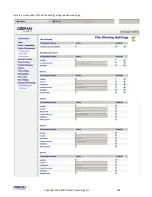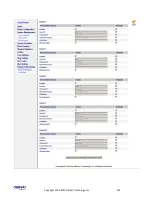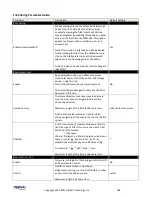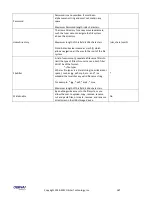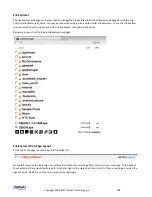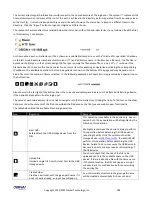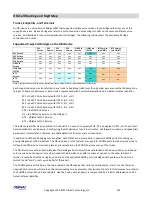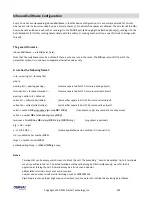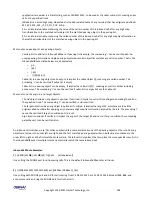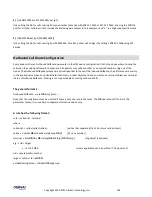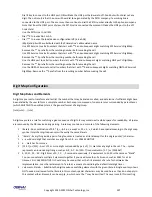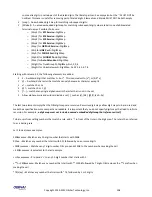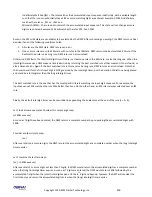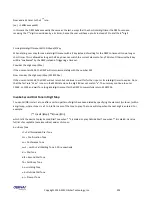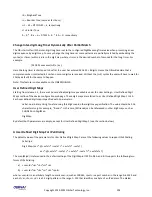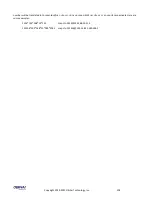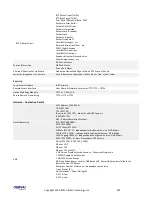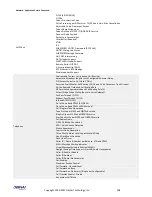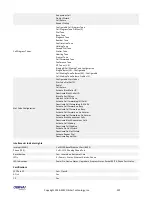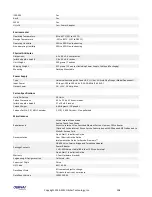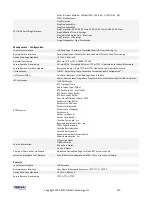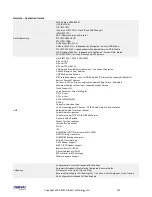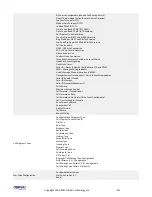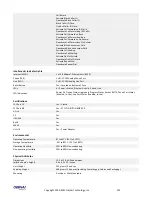
Copyright 2010-2013 Obihai Technology, Inc.
198
some extra digits in certain part of the dialed digits. The literals part can be empty also but the ‘:’ MUST NOT be
omitted. This case is useful for removing part of dialed digits.
Elements
and
literals
MUST NOT be both empty.
(
map
) – An embedded digit map for matching subsequent digits.
(M
label
) – A named embedded digit map for matching subsequent digits, where
label
is one of abbreviated
terminal names. Possible choices are:
o
(Msp1) for
SP1 Service::
DigitMap
o
(Msp2) for
SP2 Service::
DigitMap
o
(Msp3) for
SP3 Service::
DigitMap
o
(Msp4) for
SP4 Service::
DigitMap
o
(Mpp) for
OBiTALK Service::
DigitMap
o
(Mli) for
LINE Port
1
::
DigitMap
o
(Mph) for
PHONE Port::
DigitMap
o
(Mph2) for
PHONE2 Port::
DigitMap
o
(Maa) for
Auto Attendant::
DigitMap
o
(Mtg
N
) for TrunkGroup
N
::DigitMap,
N
=1,2,3,4
o
(Mvg
N
) for VoiceGateway
N
::DigitMap,
N
=1,2,3,4,5,6,7,8
Starting with release 1.2, the following elements are added:
X – A wildcard digit that matches 0–9 or *. This is equivalent to [x*] or [0-9*x]
@ – A wildcard character that matches any alphanumeric character except #
x? – matches 0 or 1 x
@? – matches 0 or 1 @
[^…] – matches any single alphanumeric character that is not in the set
Allow alphanumeric and wildcard inside a set [ ], such as [x], [X#], [@#], [a-zA-Zx]
The last two elements imply that the OBi digit maps are
recursive
. Recursive digit maps allow digit maps to be re-used and
make their specification more compact and readable. It is important that you do not specify digit maps that lead to infinite
recursion. For example,
a digit map must not include a named embedded digit map that references itself
.
To bar users from calling numbers that match a rule, add a ‘!’ in front of that rule in the digit map. The rule is then referred
to as a
barring rule
.
Let’s look at some examples.
1408xxxxxxx – Matches any 11-digit number that starts with 1408
011xx. – Matches any number that starts with 011 followed by one or more digits
<1408>xxxxxxx – Matches any 7-digit number. OBi pre-pends 1408 to the number when making the call
<:1408>xxxxxxx – Equivalent to the last example
<+>1xxxxxxxxxx – Pre-pends ‘+’ to any 11-digit number that starts with 1
<**1:>1408xxxxxxx – Matches any number that starts with **11408 followed by 7 digits. OBi removes the **1 prefix when
making the call
*74(x|xx) – Matches any number that starts with *74, followed by 1 or 2 digits
Summary of Contents for OBi100
Page 54: ...Copyright 2010 2013 Obihai Technology Inc 54...
Page 55: ...Copyright 2010 2013 Obihai Technology Inc 55...
Page 58: ...Copyright 2010 2013 Obihai Technology Inc 58...
Page 75: ...Copyright 2010 2013 Obihai Technology Inc 75...
Page 100: ...Copyright 2010 2013 Obihai Technology Inc 100...
Page 109: ...Copyright 2010 2013 Obihai Technology Inc 109 SP1 SP2 SP3 and SP4 Services...
Page 126: ...Copyright 2010 2013 Obihai Technology Inc 126...
Page 135: ...Copyright 2010 2013 Obihai Technology Inc 135...
Page 140: ...Copyright 2010 2013 Obihai Technology Inc 140...
Page 157: ...Copyright 2010 2013 Obihai Technology Inc 157...
Page 158: ...Copyright 2010 2013 Obihai Technology Inc 158...
Page 159: ...Copyright 2010 2013 Obihai Technology Inc 159...
Page 174: ...Copyright 2010 2013 Obihai Technology Inc 174...
Page 185: ...Copyright 2010 2013 Obihai Technology Inc 185...

